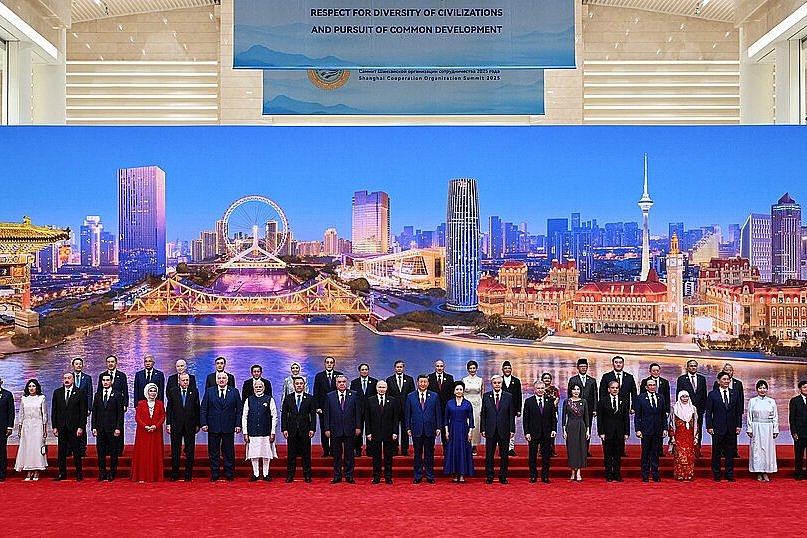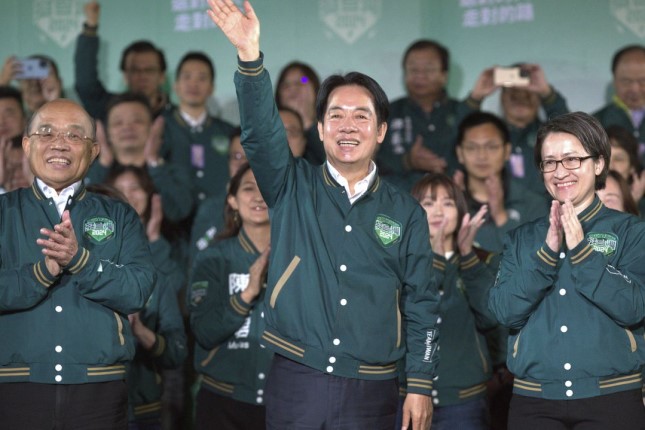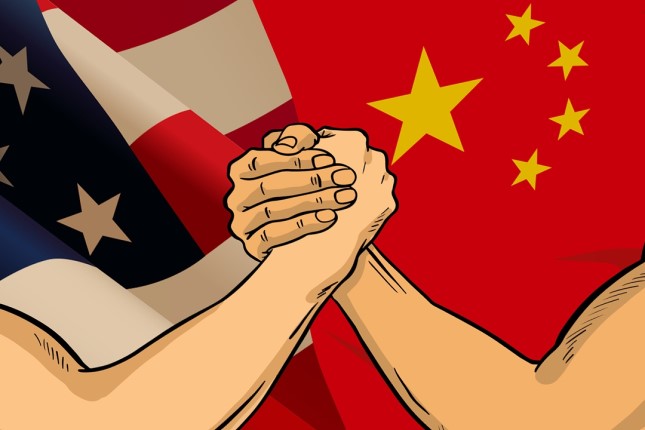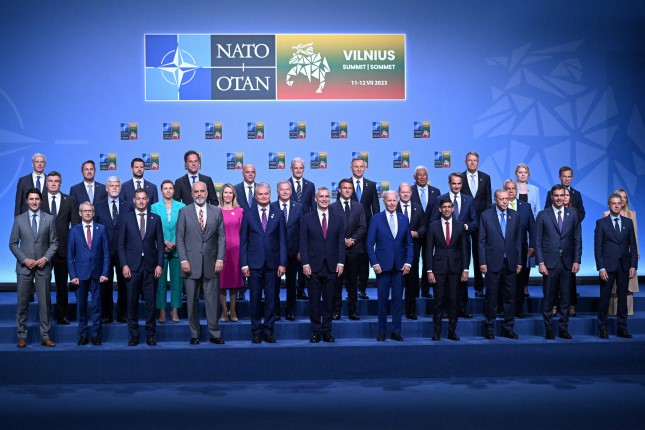All those malign authoritarians, more than 20 of them, who gathered in Tianjin at the end of August for a summit of the Shanghai Cooperation Organization: This was a festival of anti–Americanism, you need to know.
No other way to understand it. Making it all worse, Xi Jinping then invited more than two dozen heads of state to Beijing to mark the 80th anniversary of the 1945 victory.
How dare the Chinese president organize an elaborate military parade to celebrate China’s role in the historical defeat of the Imperial Japanese Army. How dare he stir pride in the People’s Republic’s determination to defend its sovereignty while refuting the revisionism — nonsensical but prevalent — that airbrushes the Chinese Communist Party out of the Second World War’s history.
The temerity of this man to suggest it was other than the Americans and their corrupt clients, the Chinese Nationalists, who did the fighting and won the war. Let us not, for heaven’s sake, make any mention of the 12 million to 20 million Chinese — there is no precise figure — who died in consequence of Imperial Japan’s aggressions.
No, nothing to honor in any of this. Between the S.C.O. and the festivities in Beijing it was all faintly demonic, a thinly veiled challenge to what the United States and the rest of the West insists is a “rules-based order.”
I keep a file labeled “Sentences to love in The New York Times.” From it: “It shows how Mr. Xi is trying to turn history, diplomacy and military might into tools for reshaping a global order that has been dominated by the United States.”
The mainstream reporting on the S.C.O. and the subsequent gathering in Beijing went on obsessively for days. You would think the Chinese were on the brink of starting another Pacific War and “invading” Taiwan—“invading” in quotation marks because a nation cannot invade territory that historically belongs to it.
As I read through the coverage I marveled at the wall-to-wall West-centricity of it. The Chinese, the Russians, the Indians, various others, even the North Koreans: They think of nothing and do nothing that does not arise from their all-consuming animosity toward the United States and altogether the West. So you read in the reporting of these events.
Then along came Donald Trump, who addressed Xi on his Truth Social platform with this, referencing the Russian and North Korean leaders as he watched the proceedings live: “Please give my warmest regards to Vladimir Putin and Kim Jong Un as you conspire against the United States of America.”
There is no beating the Trumpster when it comes to stating the case forthrightly. The mainstream press can strike the pose of objectivity all it likes, but Trump, the id of the late-phase imperium, comes right out and says it: The non–West is against us. Anti–American animosity is its sole motivation, its very raison d’être.
I write here not of our dissolute press, whose mission these past two dozen years — I take the events of September 11, 2001, as the point of departure — has been to prevent Americans from seeing and understanding the 21st century’s realities. Neither is the blunt instrument now lodged in the White House my topic.
No, the press and the president are merely exhibits, symptoms of a national failing that transcends either of these. This is the problem of America’s self-absorption, the pervasive narcissism that, it now becomes evident, is a primary cause of our troubled republic’s increasingly hostile relations with others and, so, its swift descent into isolation.
In Ovid’s Metamorphosis, Narcissus is a youth of transcendent beauty who spurns Echo, the nymph who loves him, and becomes infatuated with his own reflection in a pool of water. He thereafter takes to rejecting all admirers.
Narcissus is thus blind, but not only to others: He is also blind to himself. This fulfills the prophecy Tiresias made on his, Narcissus’s, birth: He will live long, the mythical seer said, “so long as he never knows himself.”
Narcissism is the open-and-shut condition of the elites who fashion and execute American foreign policy. They see only themselves when they look abroad at others. And they are utterly incapable of seeing themselves as they are or their country as it is.
It is dangerous to be America’s enemy, Henry Kissinger once remarked in an often-quoted comment, but it is fatal to be America’s friend. This is the United States as run by the narcissistic cliques who set the imperium’s course. Nothing and no one matters beyond their own power.
I think too much of Americans to assign this condition to them out of hand. No, it is the media’s task to impose this condition on Americans. Consider again how the press covered Tianjin and Beijing: We are encouraged in every sentence to see our reflections in those events, for they were all about us.
Read a few of these pieces carefully, I urge. You find correspondents in this or that bureau abroad who rarely quote Chinese or Russian or even European sources in support of the reporting. No, they call reliably conformist scholars or think tank denizens back in the States to tell them how to think about what is going on in China or Russia or wherever it may be.
See what I mean? Journalism this flaccid is a new one on me. If it is not American narcissism as it is in practice I do not know what else to call it.
Did you read anything in the American press about Xi’s proposal for a “Global Governance Initiative” to assist in the pursuit of a more just and equitable world order?
What about the Chinese leader’s announcement in Tianjin of a new S.C.O. development bank, grants of 2 billion renminbi, $280 million, to S.C.O. members, and an additional 10 billion renminbi, $1.4 billion, in loans?
Or his speech calling for the historical record of the Pacific War — corrupted precisely as the West cravenly erases the Soviet Union’s decisive role in defeating the Reich — to be corrected?
Let me help you out. No, no, and no. The policy cliques are indifferent to these things and you are meant not to see them, blindness to our world the preferred condition. The policy people in Washington have been captivated by their own reflections ever since they set out to achieve global dominance almost immediately after the 1945 victories.
And so long as American power was hegemonic this did not matter. Diplomacy, as Boutros Boutros–Ghali memorably remarked after the United States forced him as out as the U.N.’s sec-gen, is for the weaker nations; the strong have no need of it.
There is need of it now, to state the obvious. And we find America to be self-blinded, stumbling, uncomprehending, and altogether incapable in this, a century of swift and momentous change.
Washington’s prevalent narcissism renders proper statecraft more or less impossible, as there has been, just as Boutros–Ghali astutely observed, no need of it for most of the past eight decades. And we cannot put this down to Donald Trump alone: This has been less obviously but just as true of the administrations that preceded his.
“[W]e find America to be self-blinded, stumbling, uncomprehending, and altogether incapable in this, a century of swift and momentous change.”
At this point the late-phase imperium is more or less entirely dependent on force as its mode of expression in the community of nations.
Parenthetically, this is how I read the Trump regime’s stunning decision to rename the Defense Department the War Department, just as it was called until 1949, when it was judged necessary to veil the arriving era of America’s imperial aggressions.
Military force, increasingly vicious varieties of coercion, sanctions that amount to collective punishment, in the case of Palestinians the refusal of visas: It is all Washington can think of doing as it responds so defensibly to the 21st century. It will, of course, lead nowhere but to further isolation and decline.
At a press conference in Beijing last Tuesday, as the days of diplomacy and celebration drew to a close, a correspondent asked Vladimir Putin what he thought of Trump’s “Say hello as they conspire against us” remark on Truth Social. The Russian president’s reply was a model of statesmanship and clear thinking:
“The president of the United States is not devoid of humor — everything is clear, everyone knows it well….
I can tell you, and I hope he will hear it as well: It may seem strange, but during these four days of negotiations, both informal and formal, no one has ever expressed any negative opinions about the current American administration….
The activities of the SCO and those of our partners, including our strategic partners, are not aimed at fighting anyone, but rather at finding the best ways to develop ourselves, our countries, our peoples, and our economies.”
It is a point that cannot be made too often, so commonly is it missed. The emergence of the non–West as a bloc of nations has not a shred of anti–Americanism in it. These nations would indeed welcome the United States, with its capital, its technologies, and so on, to participate fulsomely in building the new world order to which they are dedicated.
Only hegemons are unwelcome in this decidedly ecumenical undertaking. Only narcissists. Whether or not America can at last stop staring at its own reflection to see the world around it will determine its fate in our evolving century.
Source: Consortium News.































